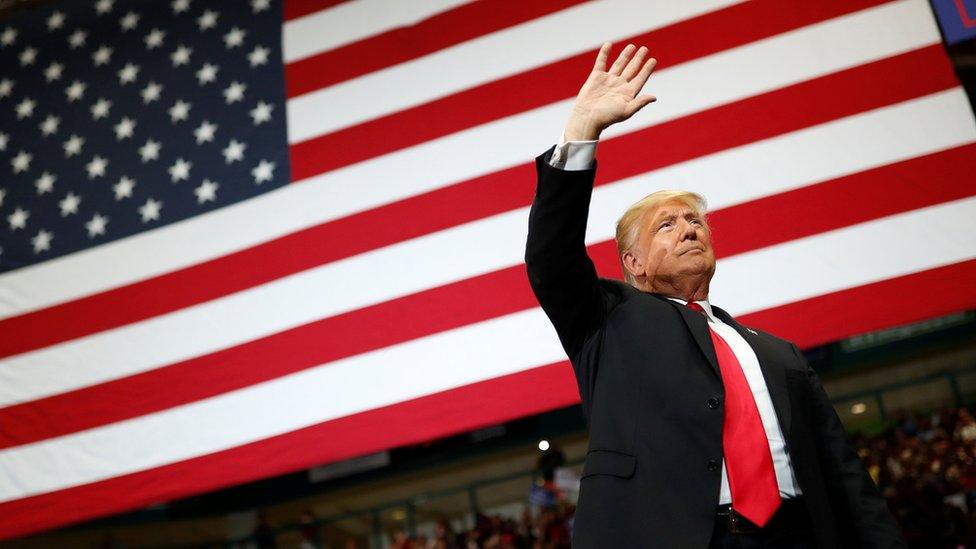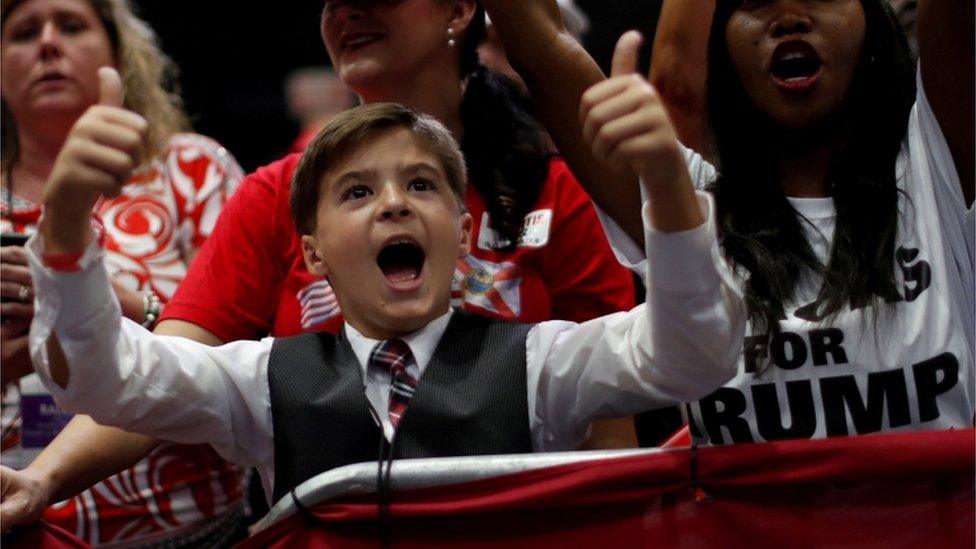Trump says he always tries to tell the truth when he can
- Published

President Donald Trump speaks during a campaign rally to help Republican candidates running in the upcoming election
US President Donald Trump says he always tries to tell the truth when he can, despite how the media portrays him.
"I do try," he told ABC News in an interview aired on Thursday. "I always want to tell the truth. When I can, I tell the truth."
Mr Trump has faced repeated criticism from US media and opponents for lying and distorting the truth around issues.
At times, conservatives have also censured the president for his claims.
"Sometimes it turns out to be where something happens that's different or there's a change, but I always like to be truthful," Mr Trump told ABC's Jonathan Karl, external.
The president also mentioned he was "pretty good" at estimating crowds during his interview, though one of the first times he clashed with the media was over the size of his inauguration crowd.
Since the start of his presidency, US media including the New York Times, Washington Post and Politifact have all kept running tallies of what they term Mr Trump's lies and misleading statements.
Politifact, which is owned by the non-profit Poynter Institute, currently has 11 pages on Mr Trump's false statements.
The Washington Post says the president has made 6,420 false or misleading claims over 649 days, external.
These, for instance, include repeated assertions about the opposition Democrats' stance on immigration and border controls, the origins of the Russia probe that centres on alleged collusion during the US presidential election campaign, and levels of spending by US allies of Nato.
Mr Trump has not escaped criticism from conservatives either over his questionable remarks.
Most recently, top Republican Paul Ryan was one of several Republicans to call into question the president's assertion that he could amend the constitution with an executive order.
Nationwide negativity?
During a Wednesday rally in Florida, ahead of next week's mid-term elections, Mr Trump re-launched his assault on US media, saying a third of Americans believed that the media was "the enemy of the people".
The US president said a third of Americans believed "fake news" media was "the enemy of the people"
He did not provide a source for this figure, but one poll from earlier this year showed that just under a third of people agreed with the idea that the media is the enemy of the people., external
Critics accuse him of fomenting violence by using extreme and divisive rhetoric against opponents, the media, immigrants and Muslims.
Mr Trump has regularly accused some sections of the media of misrepresenting his administration's work.
In July the publisher of the New York Times urged him to stop calling reporters "enemies of the people", saying it would "lead to violence" against the media.
Mr Trump's remarks come as a new NPR/PBS/Marist poll shows around 80% of voters are concerned, external that the lack of civility in Washington will incite violence.
While the overall numbers show 40% believe the president is to blame, along party lines, the figures differ as expected.
Only 7% of Republicans place the blame on the president, compared to 71% of Democrats. Republicans in turn blame Democrats, 44%, and the media, 42%.
But 45% of independent voters say Mr Trump remains the chief cause of the nationwide negative tone.

A young participant gestures during a campaign rally with President Donald Trump in Estero, Florida
What about the ad controversy?
On Wednesday, Mr Trump pinned a divisive campaign ad to his Twitter account that blamed Democrats for "letting in" criminals.
The video highlights Luis Bracamontes, an undocumented immigrant from Mexico who killed two police officers in California in 2014. It then shows images of the migrant caravan and asks: "Who else would Democrats let in?"
Democrats were quick to criticise the racially-charged ad, with Democratic National Committee Chairman Tom Perez telling CNN the ad showed "distracting, divisive Donald at his worst".
What is at stake at the mid-term elections?
Recent days have seen the president escalate his rhetoric on immigration in an apparent effort to bolster his base with five days to go before the mid-term elections.
Voters are choosing new members of Congress, but how they vote will affect how the rest of Mr Trump's presidency turns out.
Both houses of Congress are currently controlled by Mr Trump's Republican Party.
The Democrats hope to win control of the House of Representatives next week.
Doing so would let them block or delay the president's agenda.
Some opinion polls put the Democrats ahead in many places.